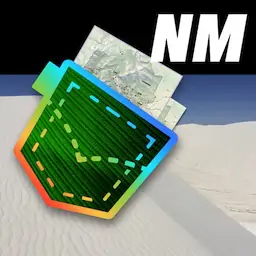"Third Fort Union Hospital1" by Fort Union National Monument , public domain
Guide 2015Fort Union |
featured in
| National Parks Pocket Maps |  | |
| New Mexico Pocket Maps |  |
Fort Union National Monument
The official newsletter
National Park Service
U.S. Department of the Interior
Vol. I No. I 2015
FortUnion PostReturn
Superintendent’s Welcome
by Charles Strickfaden Superintendent
Welcome friends and neighbors to
the first edition of our newsletter,
the Fort Union Post Return. You
are invited to discover the role Fort
Union played in shaping the culture
and society of the American Southwest. It is my hope that this newsletter will expand your view of our
many Fort Union stories, and help
make your visit an enjoyable and
recurring event!
Southwest are the stories we tell
at Fort Union.
It is a great honor to manage a
dedicated and highly skilled staff in
preserving the historic remnants of
Fort Union for future generations,
and educating the public of today
about its amazing stories. At Fort
Union National Monument community members and visitors like
you have an opportunity to take a
glimpse into the past, and reflect on
the lives of the people and communities that lived in Northeast New
Mexico. We follow in the footsteps
of thousands of years of inhabitation by Native Americans, followed
by exploration and settlement by
Spanish Conquistadors, the farmers
and ranchers of Nuevo Mexico,
Civil War soldiers, and the communities of the New Mexico Territory.
The preservation of this important place is a joint venture between the National Park Service,
our communities, and our visitors. We are all stewards of these
irreplaceable places and resources
so we can share them with our
children, and their children…
Their stories, lives, hardships, and
interactions with each other, as well
as their contributions to the diverse
culture and history of the American
As Superintendent of one of over
400 units of the National Park
System the staff of Fort Union
recognizes that there are difficult
stories from the past that must
be, and should be, told. We are
dedicated to sharing these stories
in a fair and respectful manner.
I hope you will join us as a volunteer during one of our special
events, or in our educational
outreach, as we plan for and carry
out the 100th Anniversary of the
National Park Service in 2016.
We hope you will join us during
this exciting time, and we look
forward to your visit soon!
Junior Ranger Camp
Photo credit: Lorenzo Vigil
Education Corner
Beginning in the Fall of 2013, Fort Union
National Monument introduced curriculumbased programs that have educated and
challenged hundreds of school children
throughout northern New Mexico. The
ranger-led lessons highlight the unique
historical development of New Mexico and
the pivotal role that Fort Union played in the
American Southwest during the 1800s. These
ranger-led education programs introduce
students to the rich history of the Santa Fe
Trail, Fort Union’s role in the Indian Wars and
Civil War, and what life was like for a variety
of people during this time period including
women, children, and Hispanic and AfricanAmerican soldiers.
Many of the programs focus on the intimate
connections Fort Union has with the local
surrounding communities.
For more information on or to organize an
educational ranger led activitiy either at the
fort or in the classroom, contact Education
Specialist Amy Jewell at:
Phone: (505) 425-8025 Ext 221
Email: Amy_Jewell@nps.gov
1
National Park Service
U.S. Department of the Interior
Fort Union National Monument
From 1851-1891, Fort Union was the
largest frontier military post and supply
center of the Southwest. The National
Park Service preserves and protects the
historic Fort Union and ruts of the Santa
Fe Trail.
Superintendent Charles Strickfaden
Mailing Address P.O. Box 127,
Watrous, New Mexico 87753
Kiowa ledger of Buffalo Wallow battle
Website www.nps.gov/foun
Join the Conversation
Find us on Facebook
www.facebook.com/FortUnionNM
Phone 505-425-8025, Ext 0
E-mail FOUN_interp@nps.gov
To learn more about Fort Union visit our
WNPA Park store at the Fort or online.
Park Store www.wnpa.org
Nature Corner
During your visit with us you may
regularly see a herd of 20 or more
North American Pronghorn grazing
the prairie in and around the fort.
As the fastest free roaming distance
land mammal in North America it
can average sustained speeds of 35
mph for up to four miles.
Surprisingly,
its closest
living relative
is the giraffe,
and it shares
a convergent
evolutionary
path with the
antelope.
2
Photo courtesy Texas Memorial Museum
Red River War
In late August of 1874, over 40 military
wagons laden with supplies, left
Fort Union and headed east towards
Texas. Over 200 soldiers under the
command of Major William R. Price
(8th US Cavalry) escorted the wagon
train and its contents. They monitored
the 60,000 rounds of ammunition
and 80,000 pounds of black powder
that had been carefully packed in the
wagons. Within weeks, these men and
their cargo would become heavily
involved in what historians would
eventually coin the “Red River War”.
Lasting between 1874-1875, the “Red
River War” began as members of
the Southern Cheyenne, Arapahoe,
Kiowa, and Comanche nations
retaliated against buffalo hunters who
had violated numerous treaties and
carried out the wholesale slaughter of
buffalo on tribal lands. In response,
the United States military was called
forth to stop the “insurrection” of the
tribes. Fort Union, being the supply
center and main arsenal for the US
military in the Southwest, was tasked
to provide not only men, but also
the essential military ordnance (i.e.
by Ron Harvey
Lead Interpretative Ranger
weapons, ammunition, powder) to
end the hostilities. With the assistance
of soldiers from four forts located
in Texas and Oklahoma, a series of
multi-pronged attacks ensued against
these tribes, resulting in the eventual
and permanent relocation of the tribes
onto reservations.
In commemoration of the “Indian
Wars” period and the role that Fort
Union played, the park is focusing
its 2015 interpretive programming
and special events to reflect the lives
affected by this violent period and the
events and actions the fort conducted
to see the war’s end.
The complete schedule of events for
2015 can be found on page 4 of this
publication. For additional information
visit our web site.
If you would like more information
on Fort Union and the Red
River War please contact us at:
(505) 425-8025 Ext 0.
Adobe Structures:
Early Stabilization & Maintenance
by Roger Portillo Chief of Facilities
“The building is one story high adobe walls, 18 inches thick, stone
foundation, tin roof, a battlement or
cornice of brick (to protect adobes
from action of water) 18 inches in
height, 18 inches thick, portal of
wood in front.”
Fort Union-1866
Since its inception as a national
monument the adobe remnants have
undergone both periodic stabilization
projects and continuous maintenance.
From 1956 to August 1958, archaeologist George Cattanach lead the
preservation crew in clearing rubble
and debris from the base of the walls
to return the grade to its historic level.
Efforts were largely confined to excavation and structural stabilization of
the walls.
Work under Rex Wilson (September
1958 - August 1961) included excavation but also consisted of capping walls
with soil-cement adobes, grouting
both plaster and cracks in adobe
walls with a soil-cement mixture,
and spraying walls with a silicone
water-repellent. Literally thousands of traditional and soil-cement
adobes (all produced on-site) were
used in the initial rehabilitation of Fort
Union. Resurfacing of adobe walls
with a soil-cement shelter coat is not
mentioned until about 1963, after the
departure of Rex Wilson.
Stabilization and maintenance from
1962-1972 proceeded under the daily
direction of Martin Archuleta, who
had worked with Rex Wilson. Treatments were a continuation of those
established in the early years, and
included bracing walls, capping with
soil-cement adobes, and spraying with
a silicone water repellent. The silicone
created a thin, whitish film which was
easily damaged by hail, and was regarded as unsatisfactory. The search for
Volunteer Spotlight
Richard Gonzales has been a steadfast
figure at Fort Union
National Monument
for over eight years.
During his tenure here
he has incorporated
his love of history,
photography, and
videography into his
volunteerism.
In addition to
photographing and
videotaping special
events and
Richard Gonzales
Photo credit: Amy Jewell
Fort Union Adobe Structures
more reliable methods of stabilization
and preservation was later renewed
after the collapse of several walls due
to high winds.
In 1973 a special eight-week project
was undertaken in which Navajo masons under the direction of archaeologist George Chambers, of the Arizona
Archaeological Center, reset and relaid five of the nine stone foundations
in the officers quarters. In subsequent
years through 1987 stabilization work
continued following earlier practices.
Future releases of the Post Return will
detail the continued early preservation
techniques that Fort Union undertook
to ensure the adobe remnants would
remain standing.
Richard Gonzalez
presentations at the fort, Richard
has provided invaluable
assistance to the fort’s
library and research staff.
Richard has taken the
lead in scanning historical
photographs of the fort
along with creating digital
records of the documents
pertaining to the men and
women who served in the
New Mexican regiments
during the time of the Civil
War. To date, Richard has
Photo credit: Richard Gonzales
by Amy Jewell
Education Specialist
assisted in the preservation and storage
of over 90,000 documents and images.
Richard is a New Mexico native
currently working at the Los Alamos
National Laboratory. He also enjoys
participating with the 352nd Fighter
Group Association and El Rancho
de las Golondrinas Living History
Museum in Santa Fe, NM.
We depend on volunteers like Richard!
To find out more about volunteer
opportunities at Fort Union, contact us
at (505) 425-8025 Ext 0.
3
National Park Service
U.S. Department of the Interior
Fort Union National Monument
P.O Box 127
Watrous, New Mexico 87753
FIRST-CLASS MAIL
POSTAGE AND FEES PAID
NATIONAL PARK SERVICE
PERMIT NO. G-83
Fort Union is located off of Interstate 25 near Watrous; exit 366, then proceed west 8 miles on NM-161.
Schedule of Events 2015
Glimpses of the Past 7:00 PM Third Thursday of each month from March to October
Each presentation encompasses the bountiful natural, cultural, and historical resources of the Southwest. Presentations
are given at the CCHP/Santa Fe Trail Interpretive Center on 116 Bridge Street, Las Vegas, NM.
Camp of Instruction May 9th - 10th
Step back into history and witness the training of Company “A” of the 3rd New Mexico Volunteer Infantry, one of the many
Union Hispanic Regiments organized at Fort Union that served throughout New Mexico during the Civil War. This is a great
opportunity to participate in costumed living history. Volunteers and new members are always welcome!
Fort Union Days June 20st - 21nd
Venture into Fort Union’s history in a two-day event filled with guest speakers, living history encampments, cannon and
musket firing demonstrations, and guided tours that encompass the diversity of natural, cultural, and military resources of
the fort and the surrounding area.
Junior Ranger Camp 10:00 AM - 4:00 PM - July 9 (ages 7-9) | July 10 (ages 10-12)
Bring your kids and enjoy an all-day exploration of Fort Union’s unique cultural, natural, and military aspects.
As this is a free camp, each is limited to 30 participants – please call to make a reservation. Enrollment begins June1st, 2015.
Candlelight Tours August 8th - Tour times to be announced
Step under the stars and back into history to witness historical-based skits which bring to life the stories of Fort Union’s past.
This is a highly popular event so please make your reservations in advance. Reservation dates to be announced.
First Fort & Arsenal Tours September 19th - Tour times to be announced
Journey back into history to the beginning of Fort Union at the First Fort & Arsenal site on this ranger guided tour. Open
to public access only once per year, this 45 minute tour offers the unique opportunity to walk the grounds where Fort
Union’s story began in 1851.
4


